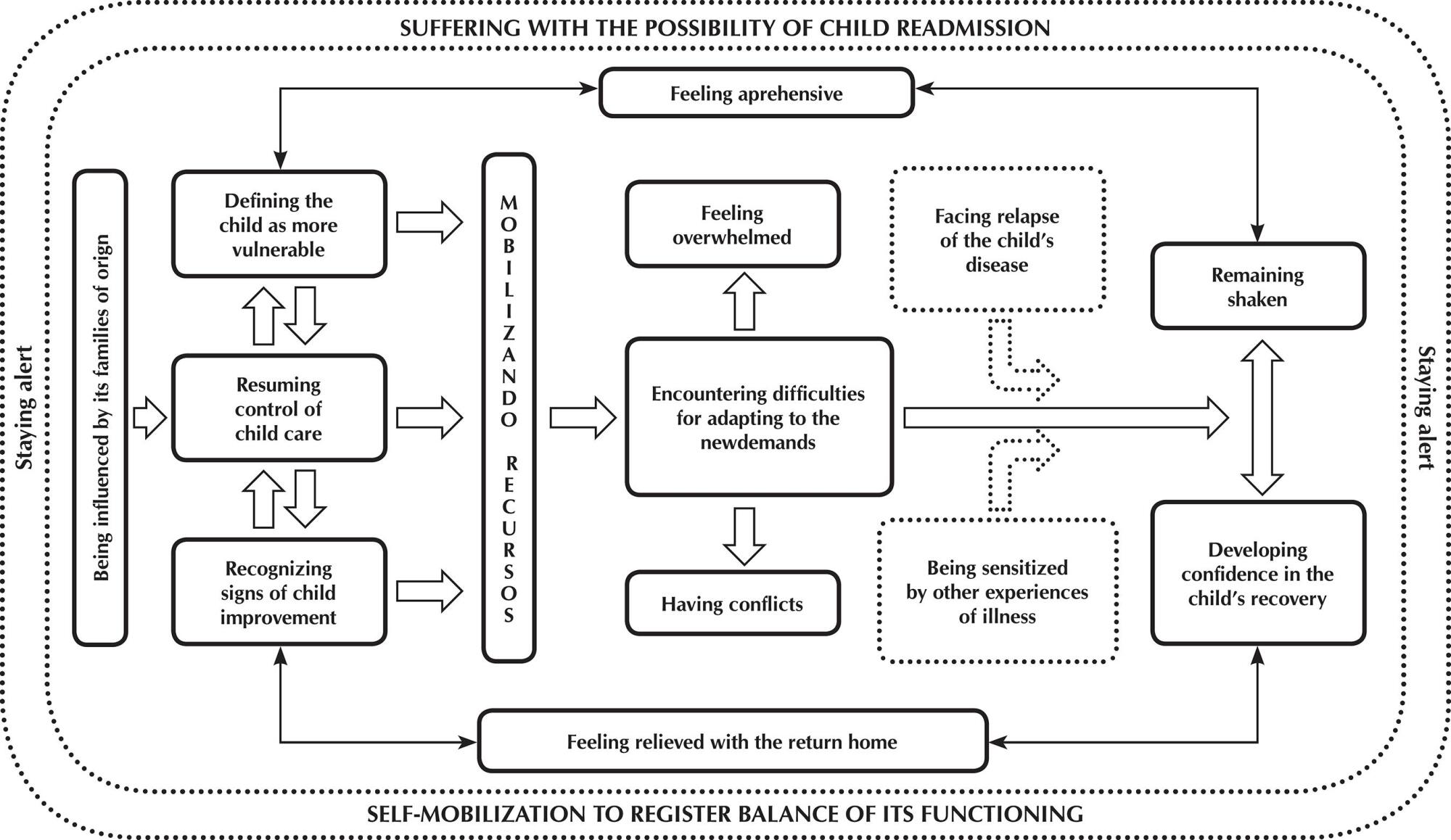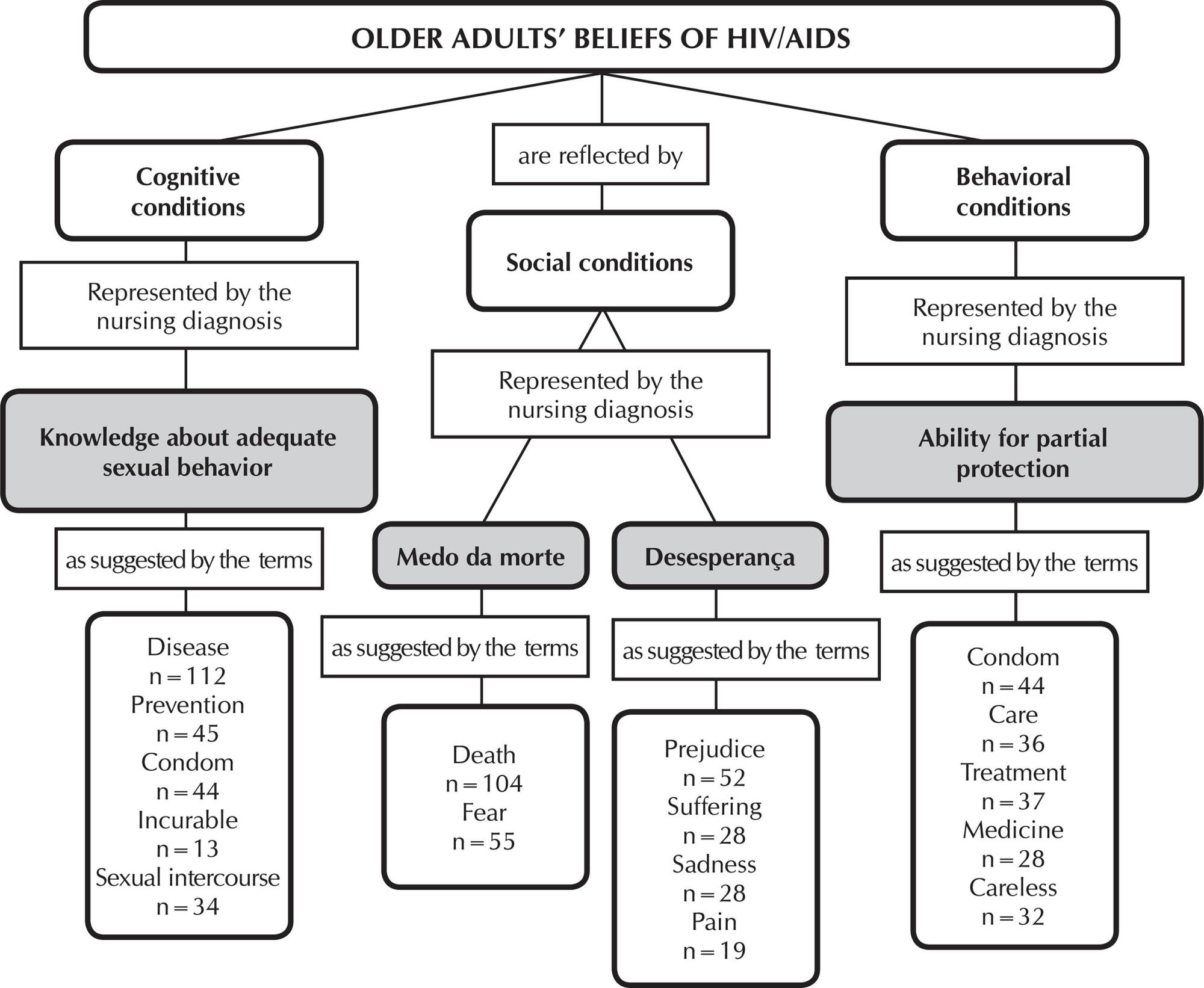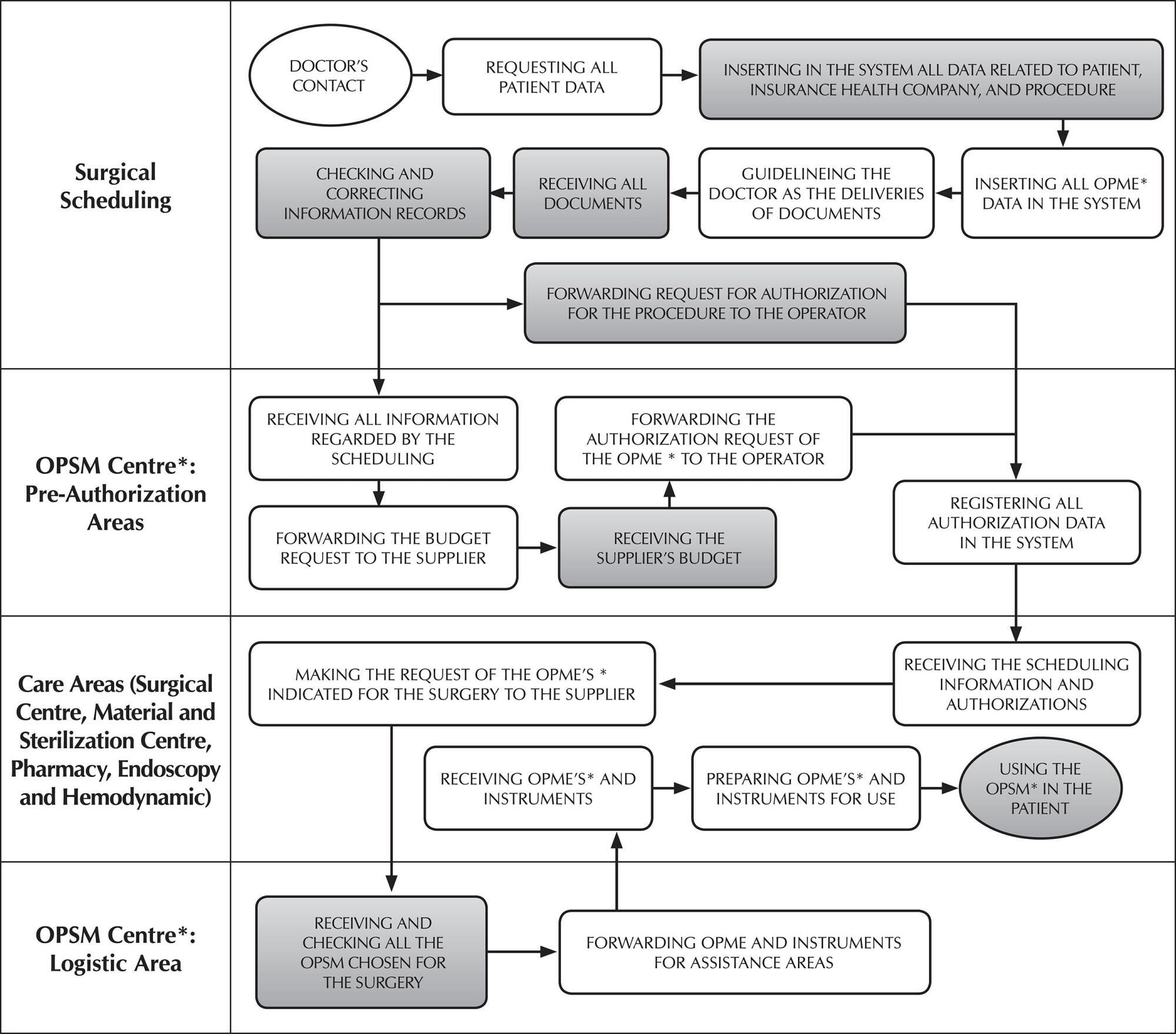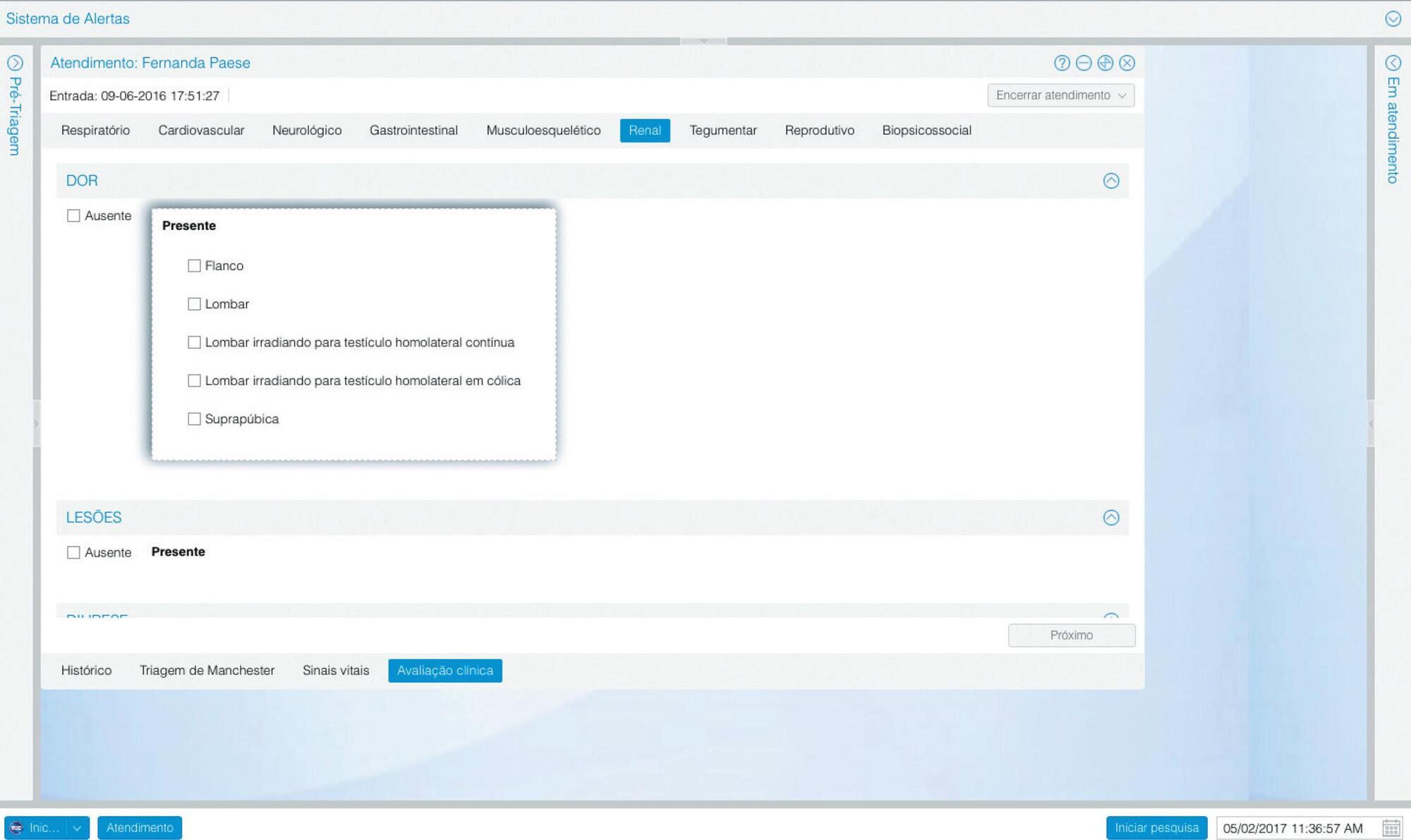-
ORIGINAL ARTICLE12-13-2024
Nurses’ experience regarding patient safety in mobile pre-hospital care
Revista Brasileira de Enfermagem. 2024;77(5):e20230529
Abstract
ORIGINAL ARTICLENurses’ experience regarding patient safety in mobile pre-hospital care
Revista Brasileira de Enfermagem. 2024;77(5):e20230529
DOI 10.1590/0034-7167-2023-0529
Views0See moreABSTRACT
Objectives:
to understand nurses’ experience regarding patient safety in mobile pre-hospital care.
Method:
a qualitative, exploratory and descriptive study, conducted with nurses active in mobile pre-hospital care services. Semi-structured interviews were conducted, audio-graved and submitted to Bardin’s content analysis.
Results:
from four thematic categories established, nurses reported the care and management skills necessary to work in this service. They demonstrated a commitment to ensuring safe care for patients, staff and spectators. They highlighted the actions taken to prevent and mitigate incidents. However, they based their experiences on practice protocols and individual actions, expressing the need to improve knowledge about patient safety.
Final Considerations:
mobile pre-hospital care nurses’ experience in relation to patient safety was limited, suggesting the need for training on the subject, alignment of work processes and implementation of strategies, aiming to guarantee safe care.
-
ORIGINAL ARTICLE12-13-2024
Repercussions of the pandemic on tuberculosis control actions from the perspective of health professionals
Revista Brasileira de Enfermagem. 2024;77(5):e20230477
Abstract
ORIGINAL ARTICLERepercussions of the pandemic on tuberculosis control actions from the perspective of health professionals
Revista Brasileira de Enfermagem. 2024;77(5):e20230477
DOI 10.1590/0034-7167-2023-0477
Views0See moreABSTRACT
Objectives:
to analyze the repercussions of the COVID-19 pandemic on tuberculosis control actions from the perspective of primary health care professionals.
Methods:
this descriptive study with a qualitative approach was conducted from November 2022 to April 2023, using semi-structured interviews with 11 key informant professionals from primary health care units in a Brazilian capital. Data were organized using Atlas.ti 22.0 software and subjected to thematic-categorical content analysis.
Results:
the pandemic scenario caused alterations in the work process, necessitating abrupt adaptations, and led to detrimental impacts on the health of professionals and tuberculosis control actions, which were reduced or discontinued.
Final Considerations:
there was evident unpreparedness and a lack of resources from various governmental levels and health services to handle the public health emergency situation without severe harm to the provision of essential services.
-
12-13-2024
Training of Brazilian indigenous nurses: between human rights, valuing diversity and inclusion
Revista Brasileira de Enfermagem. 2024;77(5):e20230430
Abstract
Training of Brazilian indigenous nurses: between human rights, valuing diversity and inclusion
Revista Brasileira de Enfermagem. 2024;77(5):e20230430
DOI 10.1590/0034-7167-2023-0430
Views0See moreABSTRACT
Objectives:
to analyze the possibilities and potential of training indigenous nurses, given the Brazilian Health System (SUS), understanding the relationships between education and health.
Methods:
theoretical-reflective study, based on scientific literature, aligned with the experience, critical thinking of its authors and the Sustainable Development Goals in Brazil.
Results:
this text articulates three axes: Potential for including indigenous students in nursing training; Paths to achieving equity through inclusion and retention policies for indigenous students at different levels; and Implications of this for the SUS and global health.
Final Considerations:
indigenous students, beneficiaries of affirmative actions, face challenges of inclusion and retention in public universities that directly impact their academic training. Added to this are the difficulties identified in basic education, professor training and implementation of permanence policies, with consequences for services and training at other levels.
-
ORIGINAL ARTICLE12-13-2024
Interobserver agreement in Reception and Risk Stratification in Obstetrics implementation
Revista Brasileira de Enfermagem. 2024;77(5):e20230361
Abstract
ORIGINAL ARTICLEInterobserver agreement in Reception and Risk Stratification in Obstetrics implementation
Revista Brasileira de Enfermagem. 2024;77(5):e20230361
DOI 10.1590/0034-7167-2023-0361
Views0See moreABSTRACT
Objectives:
to analyze interobserver agreement in the Reception and Risk Stratification in Obstetrics protocol implementation.
Methods:
a cross-sectional study carried out during Reception and Risk Stratification in Obstetrics implementation, conducted in a tertiary hospital in southern Brazil with 891 participants in January 2020. Descriptive and interobserver agreement analysis was carried out using the Kappa coefficient in the risk stratification assigned by the triage nurse and reviewed by the researcher.
Results:
around half of the calls (55.6%) were stratified as not very urgent (green), followed by urgent (yellow) (31.8%), very urgent (orange) (9.3%), not urgent (blue) (3.4%) and no emerging stratification (red). Agreement analysis of revised stratification found Kappa values of 0.20 (blue), 0.54 (green), 0.77 (yellow) and 0.80 (orange).
Conclusions:
most appointments were non-urgent. The agreement analysis between the revised and assigned risk stratification revealed greater interobserver agreement as the priority level increased.
-
ORIGINAL ARTICLE12-13-2024
Adaptation and implementation of a Nursing care protocol for children in the Amazon Region
Revista Brasileira de Enfermagem. 2024;77(5):e20230245
Abstract
ORIGINAL ARTICLEAdaptation and implementation of a Nursing care protocol for children in the Amazon Region
Revista Brasileira de Enfermagem. 2024;77(5):e20230245
DOI 10.1590/0034-7167-2023-0245
Views0See moreABSTRACT
Objectives:
to describe the process of implementing an adapted protocol for pediatric nursing care in a health unit located in a municipality in the Amazon Region.
Methods:
methodological research conducted in a basic health unit with four family health teams in the state of Rondônia, involving seven nursing professionals. Data collection occurred between October 2020 and April 2022, following the research phases: situational diagnosis, exploratory phase, protocol definition, implementation, and evaluation.
Results:
the outcome was the adaptation and implementation of a nursing care protocol for children.
Final Considerations:
the adaptation and implementation process can be an effective approach to improving care, strengthening nursing as a profession with a solid foundation in scientific and clinical evidence. This facilitates early problem identification and appropriate guidance, leading to better health outcomes for children.
-
ORIGINAL ARTICLE12-13-2024
Nurses’ experiences in caring for people with mental health problems hospitalized due to clinical comorbidities
Revista Brasileira de Enfermagem. 2024;77(5):e20230136
Abstract
ORIGINAL ARTICLENurses’ experiences in caring for people with mental health problems hospitalized due to clinical comorbidities
Revista Brasileira de Enfermagem. 2024;77(5):e20230136
DOI 10.1590/0034-7167-2023-0136
Views0See moreABSTRACT
Objectives:
to understand nurses’ experiences in caring for people with mental health problems hospitalized due to clinical comorbidities in non-psychiatric Inpatient Units.
Methods:
qualitative study, guided by Alfred Schutz’s social phenomenology. Sixteen phenomenological interviews were conducted. The content was analyzed and discussed based on the literature, through the composition of three categories of analysis.
Results:
three categories emerged in the study: Challenges in care faced by nurses; Fragmented care action; and Ideal care. The disarticulation of the clinic was revealed, as described by nurses, showing care as an action far removed from the comprehensiveness of a person. Nurses’ performance is guided predominantly by biomedical reference, disregarding appreciation of subjectivity.
Final Considerations:
it was observed that nurses attribute the responsibility for patient care to factors external to their life-world, when, in fact, these aspects should be components that help them in comprehensive care construction.
-
REVIEW11-29-2024
Assessment of knowledge in oncology about care for transgender people: a scoping review
Revista Brasileira de Enfermagem. 2024;77:e20230532
Abstract
REVIEWAssessment of knowledge in oncology about care for transgender people: a scoping review
Revista Brasileira de Enfermagem. 2024;77:e20230532
DOI 10.1590/0034-7167-2023-0532
Views0See moreABSTRACT
Objective:
to identify evidence available in the literature on instruments and methodologies used to assess healthcare professionals’ knowledge about cancer care for the transgender population.
Methods:
a scoping review was conducted in seven databases, including studies that answered the question: what is the healthcare professionals’ level of knowledge about cancer care for the transgender population?
Results:
forty-one articles were selected that dealt specifically with healthcare professionals’knowledge in relation to care for the LGBTQIAPN+ population, especially the transgender population. Eighteen studies assessed patients’ perceptions of professionals’knowledge, whereas other studies used their own assessment tools, considering the global context of LGBTQIAPN+ health.
Conclusions:
there is no tested and validated instrument that assesses the knowledge about the transgender population’s oncological health, highlighting the need to construct and validate an instrument focused on this population’s needs.

-
ORIGINAL ARTICLE11-29-2024
Sleep quality of vulnerable elderly people: associated factors
Revista Brasileira de Enfermagem. 2024;77:e20230283
Abstract
ORIGINAL ARTICLESleep quality of vulnerable elderly people: associated factors
Revista Brasileira de Enfermagem. 2024;77:e20230283
DOI 10.1590/0034-7167-2023-0283
Views0See moreABSTRACT
Objective:
To identify factors associated with poor sleep quality in elderly dependent individuals in social vulnerability.
Method:
Cross-sectional study with 59 elderly dependent individuals assisted by Family Health Units in São Carlos/SP. The following tools were used: Katz Index, Lawton and Brody Scale, Pittsburgh Sleep Quality Index, Addenbrooke’s Cognitive Examination Revised, Fried’s Frailty Phenotype, Geriatric Depression Scale (15 items), Perceived Stress Scale, Family APGAR, Social Support Scale from the Medical Outcomes Study, and World Health Organization Quality of Life, abbreviated and “old” versions.
Results:
The majority of participants were women (52.5%), aged 60-74 years (71.1%), and had poor sleep quality (76.2%). Stress (OR=1.12; 95%CI=1.02-1.22) and polypharmacy (OR=7.39; 95%CI=1.22-44.73) increased the chances of poor sleep quality, while physical activity decreased these chances (OR=0.15; 95%CI=0.02-0.79).
Conclusion:
Stress and polypharmacy are associated with poor sleep quality in elderly dependent individuals.
-
01-01-2015
Social representations about religion and spirituality
Revista Brasileira de Enfermagem. 2015;68(4):609-616
Abstract
Social representations about religion and spirituality
Revista Brasileira de Enfermagem. 2015;68(4):609-616
DOI 10.1590/0034-7167.2015680406i
Views0See moreABSTRACT
Objective:
to identify the social representations about the concepts of spirituality and religion of of health teachers.
Method:
exploratory and descriptive study, based on a qualitative approach. 25 subjects participated in it. The following instruments were used to collect data: questionnaire to identify the profile; questionnaire of free association, whose inducing words were religion and spirituality, and an interview based on the scale FICA (Puchalski, 2006).
Results:
the representations about religion and spirituality, for professors, are forged around the faith in God and it gives them meaning and purpose to deal with the challenges of personal and professional living.
Conclusion:
there are still barriers that need to be overcome with a view to a comprehensive care. For this, it is essential to incorporate spirituality in the process in the curricula of health courses.

-
01-01-2015
Prevalence and factors associated with smoking among tobacco growers in southern Brazil
Revista Brasileira de Enfermagem. 2015;68(4):603-608
Abstract
Prevalence and factors associated with smoking among tobacco growers in southern Brazil
Revista Brasileira de Enfermagem. 2015;68(4):603-608
DOI 10.1590/0034-7167.2015680405i
Views0See moreABSTRACT
Objective:
identify the prevalence and factors associated with smoking in tobacco growers.
Method:
descriptive, cross-sectional research. Data collection occurred in 2012 through household survey and interviews, including application of a structured instrument and scale Fargeström.
Results:
there were 100 growers included, average age of 46,9 ± 10,8 years; 90(90%) married; 72(72%) white, average family composition 3,7±1,1 people; median number of children 3(1-3), and the average study time 6±2,5. The prevalence of smoking among tobacco growers was 17%, which had less education (p=0.010) and fewer people in the household (p=0.049).
Conclusion:
the prevalence of smoking among tobacco growers was higher than the national average, but the nicotine dependence was low, which can facilitate the smoking cessation process. Highlights the need to implement a program to control smoking among tobacco growers.
-
01-01-2015
The family living the child recovery process after hospital discharge
Revista Brasileira de Enfermagem. 2015;68(4):594-602
Abstract
The family living the child recovery process after hospital discharge
Revista Brasileira de Enfermagem. 2015;68(4):594-602
DOI 10.1590/0034-7167.2015680404i
Views1See moreABSTRACT
Objective:
to understand the meaning attributed by the family to its experience in the recovery process of a child affected by an acute disease after discharge, and to develop a theoretical model of this experience. Symbolic interactionism was adopted as a theoretical reference, and grounded theory was adopted as a methodological reference.
Method:
data were collected through interviews and participant observation with 11 families, totaling 15 interviews. A theoretical model consisting of two interactive phenomena was formulated from the analysis: Mobilizing to restore functional balance and Suffering from the possibility of a child’s readmission.
Results:
the family remains alert to identify early changes in the child’s health, in an attempt to avoid rehospitalization.
Conclusion:
the effects of the disease and hospitalization continue to manifest in family functioning, causing suffering even after the child’s discharge and recovery.

-
01-01-2015
Multiprofessional residency in health: a document analysis of political pedagogical projects
Revista Brasileira de Enfermagem. 2015;68(4):586-593
Abstract
Multiprofessional residency in health: a document analysis of political pedagogical projects
Revista Brasileira de Enfermagem. 2015;68(4):586-593
DOI 10.1590/0034-7167.2015680403i
Views0See moreABSTRACT
Objective:
To analyze MPRH political pedagogical projects (PPP) developed in the state of São Paulo and identify scenarios that are highly favorable to IPE.
Method:
This was a descriptive exploratory study conducted through document analysis.
Results:
The analysis revealed a heterogeneous scenario regarding the curricula, didactic and pedagogical organization, educational objectives, pedagogical matrices and evaluation systems employed. One of the programs was identified as providing a highly favorable setting for IPE.
Conclusion:
The analysis adequately evaluated IPE in educational settings and found a highly favorable scenario for it, identifying didactic, pedagogical, political and organizational MPRH elements.
-
01-01-2015
Beliefs of older adults about their vulnerability to HIV/Aids, for the construction of nursing diagnoses
Revista Brasileira de Enfermagem. 2015;68(4):579-585
Abstract
Beliefs of older adults about their vulnerability to HIV/Aids, for the construction of nursing diagnoses
Revista Brasileira de Enfermagem. 2015;68(4):579-585
DOI 10.1590/0034-7167.2015680402i
Views0See moreABSTRACT
Objective:
to know the beliefs of older adults about their vulnerability to HIV/Aids, and to identify nursing diagnoses.
Method:
a field research implemented in Family Health Units, in João Pessoa, Brazil. The sample included 250 older adults of both genders with data collected from April to July of 2011. A Test of Free Word Association was applied using the term HIV/Aids. A content analysis and cross-mapping of the most frequent terms with the International Classification for Nursing Practice, 2011 were performed.
Results:
202 terms were identified in terms, with an overall frequency of 1156. Of the 202 terms, 16 were more frequent and were used to construct the nursing diagnoses. The diagnoses identified were knowledge about appropriate sexual behavior, ability for partial protection, fear of death and hopelessness.
Conclusion:
understanding these beliefs drew from knowledge about factors related to, vulnerability to HIV/Aids aimed at planning health care actions for this population segment.

-
LETTER TO THE EDITOR01-01-2015
Considerations about the manuscript published
Revista Brasileira de Enfermagem. 2015;68(4):577-577
Abstract
LETTER TO THE EDITORConsiderations about the manuscript published
Revista Brasileira de Enfermagem. 2015;68(4):577-577
DOI 10.1590/0034-7167.20156804c
Views0Re: Chinese auriculotherapy to improve quality of life of nursing team To the Editor,[…]See more -
01-01-2015
Research in nursing and new pathways based on SENPE
Revista Brasileira de Enfermagem. 2015;68(4):571-572
Abstract
Research in nursing and new pathways based on SENPE
Revista Brasileira de Enfermagem. 2015;68(4):571-572
DOI 10.1590/0034-7167.2015680401i
Views1Almost half a century after the beginning of nursing research in Brazil, there is still a need for investment before it can be considered consolidated. The truth of this statement can be seen in the national seminars that discuss research in the field through 17 events that present results and participation of nursing researchers and […]See more
-
RESEARCH01-01-2018
Validation of a care protocol for the septic patient in the Intensive Care Unit
Revista Brasileira de Enfermagem. 2018;71(3):1106-1114
Abstract
RESEARCHValidation of a care protocol for the septic patient in the Intensive Care Unit
Revista Brasileira de Enfermagem. 2018;71(3):1106-1114
DOI 10.1590/0034-7167-2017-0312
Views0See moreABSTRACT
Objective:
to elaborate and validate a protocol for the care of the nurse to the septic patient in Intensive Care Units (ICUs).
Method:
instrument validation study. Two steps were followed: instrument development and content validation according to the Delphi technique.
Results:
the validation of contents related to the nurse’s assistance to the septic patient in intensive care was initially composed of eighteen items analyzed by the evaluators/judges. From this, through the Content Validity Index (CVI), thirteen items with strong evidence of validation were identified, CVI = 0.79. Then the instrument was refined, being then composed of fifteen items, which in the second phase Delphi had a percentage of agreement above 84% for the variables pertinent to the protocol.
Conclusion:
the method was effective to validate the contents of a protocol for the nurse’s assistance to the septic patient in the ICU.
-
RESEARCH01-01-2018
Assessment of the care process with orthotics, prosthetics and special materials
Revista Brasileira de Enfermagem. 2018;71(3):1099-1105
Abstract
RESEARCHAssessment of the care process with orthotics, prosthetics and special materials
Revista Brasileira de Enfermagem. 2018;71(3):1099-1105
DOI 10.1590/0034-7167-2017-0031
Views0See moreABSTRACT
Objective:
to assess potential failures in the care process with orthotics, prosthetics and special materials in a high-complexity hospital.
Method:
an intervention study conducted from March to October 2013. This process was assessed with the Failure Mode and Effects Analysis (FMEA) service tool. The data were analysed according to the risk and the corrective measures were defined.
Results:
no failure was classified as high risk and the corrective measures indicated as low and moderate risk had the following improvement initiatives suggested: standardize the material records in the information system; create a specific form to require materials; hire specialized technical personnel and create a continuous education program.
Conclusion:
all the suggested initiatives were implemented and helped to reduce the assistance risks for patients due to failures in this process. The actions increase safety levels and provide higher quality of service.

-
RESEARCH01-01-2018
Nursing care to patients with diabetes based on King’s Theory
Revista Brasileira de Enfermagem. 2018;71(3):1092-1098
Abstract
RESEARCHNursing care to patients with diabetes based on King’s Theory
Revista Brasileira de Enfermagem. 2018;71(3):1092-1098
DOI 10.1590/0034-7167-2016-0268
Views1See moreABSTRACT
Objective:
To verify the effectiveness of nursing interventions based on the Imogene King’s Theory of Goal Attainment, on improving care for people with diabetes and adherence to treatment.
Method:
Quasi-experimental, longitudinal, randomized, simple study in a Primary Health Care Unit, in the city of Fortaleza, Ceará state, Brazil. The sample consisted of 60 people with diabetes, divided into intervention and control groups, whose collection occurred from February to August 2013.
Results:
In the intervention group, a significant adherence of the patients to the goals defined in the study was found. In the control, there was improvement in some aspects of the treatment.
Conclusion:
With these results, it was possible to conclude the feasibility of using Theory of Goal Attainment in the positive aspects for adherence to diabetes treatment and improvement of quality of life.
-
RESEARCH01-01-2018
Intervention in social skills and bullying
Revista Brasileira de Enfermagem. 2018;71(3):1085-1091
Abstract
RESEARCHIntervention in social skills and bullying
Revista Brasileira de Enfermagem. 2018;71(3):1085-1091
DOI 10.1590/0034-7167-2017-0151
Views0See moreABSTRACT
Objective:
to verify if the improvement of social and emotional skills reduces bullying victimization in 6th grade students 12 months after the end of the intervention.
Method:
Quasi-experimental study with 78 students who were bullying victims. A cognitive behavioral intervention based on social skills was conducted with the intervention group. The eight sessions addressed politeness, making friendships, self-control, emotional expressiveness, empathy, assertiveness and solution of interpersonal problems. Data were analyzed using Poisson regression with random effect.
Results:
Quasi-experimental study with 78 students who were bullying victims. A cognitive behavioral intervention based on social skills was conducted with the intervention group. The eight sessions addressed politeness, making friendships, self-control, emotional expressiveness, empathy, assertiveness and solution of interpersonal problems. Data were analyzed using Poisson regression with random effect.
Conclusion:
Social skills are important in anti-bullying interventions and can be the basis for intersectoral interventions in the health area, aimed at favoring the empowerment of victims by improving their social interactions and quality of life in school.
-
RESEARCH01-01-2018
Structuring methodology of the Computerized Nursing Process in Emergency Care Units
Revista Brasileira de Enfermagem. 2018;71(3):1079-1084
Abstract
RESEARCHStructuring methodology of the Computerized Nursing Process in Emergency Care Units
Revista Brasileira de Enfermagem. 2018;71(3):1079-1084
DOI 10.1590/0034-7167-2016-0619
Views0See moreABSTRACT
Objective:
To structure the Computerized Nursing Process using the International Classification for Nursing Practice (ICNP®) version 2.0 to emergency care units in a computerized structure.
Method:
This is a methodological and technological research that followed the stages: (1) establishment of the development team and resources; (2) adequacy of clinical situations, diagnoses and nursing interventions for the emergency area; (3) association of diagnoses and interventions based on ICNP®; (4) organization and codification of clinical evaluation, diagnoses and nursing interventions; (5) transfer of data to the a computerized platform.
Results:
Readjustment and construction of 1,445 possibilities of clinical evaluations associated with 961 different diagnoses and their corresponding interventions to the most frequent situations in emergency services.
Conclusion:
ICNP® has a strong and solid form for the development of the computerized nursing process able to support nurses in safe decision-making to improve the quality of health care.

-
RESEARCH01-01-2018
Competencies for educational actions of Family Health Strategy nurses
Revista Brasileira de Enfermagem. 2018;71(3):1072-1078
Abstract
RESEARCHCompetencies for educational actions of Family Health Strategy nurses
Revista Brasileira de Enfermagem. 2018;71(3):1072-1078
DOI 10.1590/0034-7167-2017-0390
Views0See moreABSTRACT
Objective:
To create competencies for the educational actions of nurses in the care and management work processes at the Family Health Strategy.
Method:
This is an exploratory, descriptive research, with a qualitative approach, on nurses of the Family Health Strategy (FHS) from a municipality in the Greater São Paulo. It was performed through semi-structured interviews and workshops.
Results:
There is a set of specific competencies for the educational actions of the nurse in care work, geared towards meeting the health needs of users/community; and for educational actions in management work, focused on work organization of the health team, indicating the importance of this work to FHS.
Final considerations:
Creating competencies proved to be significant to reflect on the educational actions of the FHS nurses and can be used as a strategy in permanent education processes.
-
RESEARCH01-01-2018
Longitudinality in Primary Health Care: a comparison between care models
Revista Brasileira de Enfermagem. 2018;71(3):1063-1071
Abstract
RESEARCHLongitudinality in Primary Health Care: a comparison between care models
Revista Brasileira de Enfermagem. 2018;71(3):1063-1071
DOI 10.1590/0034-7167-2017-0014
Views0See moreABSTRACT
Objective:
to evaluate the attribute longitudinality in different models of assistance in Primary Health Care and observe its association with demographic, socioeconomic and health care characteristics.
Method:
a cross-sectional study, carried out in 2015 with 1076 adult users of primary care services in the 32 cities of the 4th Regional Health Care Core of Rio Grande do Sul State. The Primary Care Assessment Tool was used with definition of low (<6.6) or high (≥6.6) score for longitudinality. The association with independent variables was observed through the Poisson regression.
Results:
the attribute was better assessed in the Family Health Strategy and associate with age, housing health region and care model.
Conclusion:
the study points out the Family Health Strategy as a promoter of longitudinal care, and so, it suggests the expansion of this assistance model coverage for quality improvement in health care.
-
RESEARCH01-01-2018
Effectiveness of an educational intervention on knowledge-attitude-practice of older adults’ caregivers
Revista Brasileira de Enfermagem. 2018;71(3):1055-1062
Abstract
RESEARCHEffectiveness of an educational intervention on knowledge-attitude-practice of older adults’ caregivers
Revista Brasileira de Enfermagem. 2018;71(3):1055-1062
DOI 10.1590/0034-7167-2017-0100
Views0See moreABSTRACT
Objective:
To compare the knowledge, attitude and practice of older adults’ caregivers before and after an educational intervention in the domains of the care between caregiver and older adult, feeding, bathing, hygiene and mobility and transportation.
Method:
Quasi-experimental study carried out with 82 caregivers, of which 34 participated in the intervention. Interviews were conducted through a knowledge, attitude and practice research on the older adults` care
Results:
The educational intervention led to improvements in knowledge, attitude and practice, with statistical significance of attitude (p <0.020) and practice (p <0.001), in the domain of the care between caregiver and older adult; knowledge (p <0.001) and practice (p <0.003) in feeding; Knowledge (p <0.001) and practice (p <0.001) in bathing and hygiene; and knowledge (p <0.001), attitude (p <0.001) and practice (p <0.001) in mobility and transportation. The analysis of the 34 caregivers who started and completed the study showed an improvement in attitude in most of the domains.
Conclusion:
the educational intervention is an effective and viable strategy for older adults’ caregivers.
Search
Search in:
Nuvem de Tags
Adolescente (85) Atenção Primária à Saúde (239) COVID-19 (91) Criança (91) Cuidados de Enfermagem (269) Educação em Enfermagem (151) Educação em Saúde (139) Enfermagem (930) Enfermagem Pediátrica (86) Estudantes de Enfermagem (77) Estudos de Validação (131) Família (87) Idoso (208) Promoção da Saúde (99) Qualidade de Vida (104) Saúde do Trabalhador (86) Saúde Mental (145) Saúde Pública (82) Segurança do Paciente (150) Tecnologia Educacional (100)



